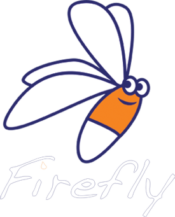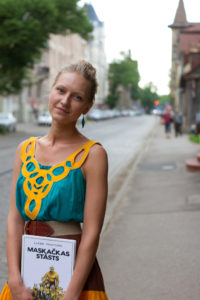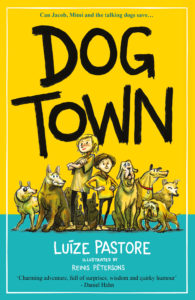Luīze Pastore is an award-winning Latvian author whose children’s novel, Dog Town, was published by Firefly in 2018. In this new blog she writes for Firefly readers about her horror at the war in Ukraine, and what it means for the children of Latvia, which was itself part of the USSR until 1991.
My name is Luīze Pastore. I am Latvian. In the last ten years I’ve been writing stories for Latvian children and most of them have our complicated history as the background to my plots. Mostly because it is simply impossible to avoid the history if you want to write a truthful story about anything in the Latvian past.
I was born in the USSR in 1986, and I was five years old when my father left our house to join other civilians in barricades in Riga to defend the dream of maintaining our free, sovereign country. He was there with his bare hands ready to face Soviet tanks. Latvia, which had just regained independence from the Soviet Union, anticipated that the Soviet Union would attempt to regain control over the country by armed force. It is probably only now that I fully comprehend the level of bravery that these people like my father had. Watching the Ukrainian civilians lying down in front of Russian tanks is heroism worth showing to my kids.
Here in Latvia our kids are waking up in a safe place. Our country has been a member of NATO since 2004 and we are reassuring our children that this means that we are “all for one, and one for all”. There is no fear that this promise would be lost. But I am very sure that every child in this country knows that the war is very close – just across two borders – and that it affects every single one in the world. Latvian children – Latvian speaking, Russian speaking, with Ukrainian, Polish, Lithuanian or Estonian backgrounds are joining their parents in peaceful protests, demonstrations and concerts, helping to pack humanitarian aid supplies to donate, showing all their support to Ukraine and admiring its level of bravery no one has seen before. It’s bravery has made Ukraine the “biggest” country in the world.
My children are five and three years old, and they know that soon there will be a Ukrainian family living in our house. They are packing their best toys to give away to children that might take a refuge under our roof. They are watching photos of newborn babies in the bomb shelters in Kiev. They do not get to watch war scenes, but they see rage, tears, sadness and determination in their parents’ eyes. They are slowly comprehending their privilege in being free – one thing no child in the world should busy their brains with.
I’ve been living in a free country since I was five and never imagined that the day when I should prepare my kids for 72-hour survival mode would come. I don’t want to live in the world where my children need to know how to pack a “72 hour survival bag” and how to safely evacuate to the basement of our house in the case of air strikes. I choose a world where my kids have terrible morning tantrums over a “wrong breakfast serving” instead of freezing in silence overhearing a daily dose of adult news in the radio. I want the same thing for the Ukrainian children – to have ordinary lives with ordinary happiness and ordinary failure.
There are a great many Russian-speaking families in Latvia that have different thoughts. People are overhearing small boys playing war games, shooting their wooden pistols in favour of the Russian side. This is the result of Russian media propaganda, the terrible lie bubble. Now that the propaganda media are finally banned and cut off in Latvia, people start to open their eyes. And it will not be easy times neither for them, nor for us because the integration of the Russian-speaking population for years and years has been a failure. Our children meet in the same kindergarten, though they never meet on the same ground. Luckily this is just one part of the Russian speaking population. The rest stand for Ukraine, for democracy, for European values.
We are not a particularly religious nation. We know that praying is not enough.
But Latvians are famous for their ability to sing the enemy away. Peaceful protests may seem naïve, but they perform a significant role – they bring people from different backgrounds together in times when everything and everyone is trying to split them apart and set them against each other. The “evil president” – as my children call Putin – thrives on frightened and fragmented society; this is exactly why one of my tasks is to teach my children not to become russophobes.
They are still allowed to hate the “evil president”. Obviously.
#slavaukraine #westandwithukraine
Luīze Pastore is the author of ten children’s books, and has just won the New Horizons Bolognaragazzi Prize 2022, to be awarded at the Bologna Book Fair later this month. Her work has been translated into French, English and Estonian, and includes Dog Town (Firefly Press 2018) which was a Guardian pick and a Times Children’s Book of the Week. Luīze lives in Latvia with her young family and dog.



